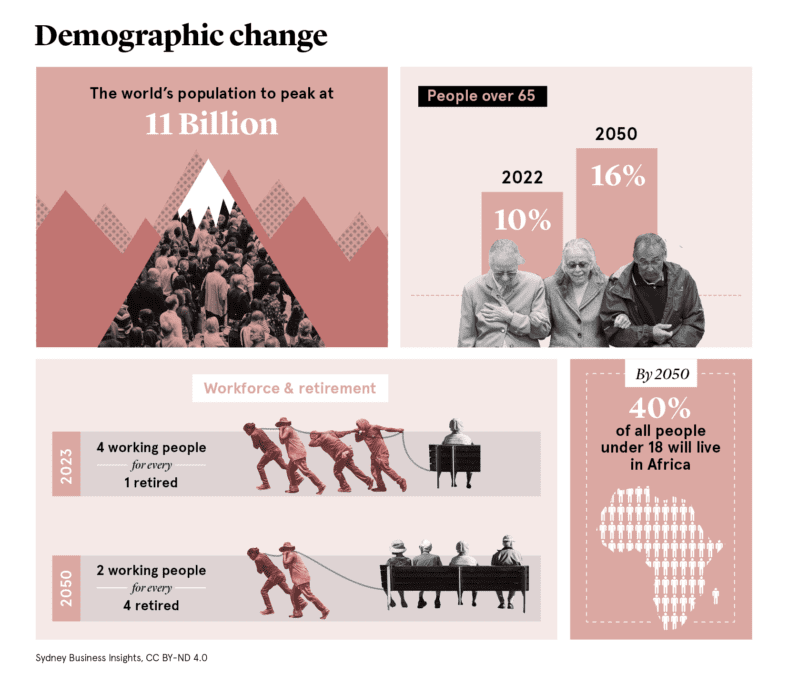After more than 200 years of rapid growth, the world’s population is set to peak at 11 billion by the end of this century.
People are having fewer children, and living longer.
This is the demographic change megatrend – a profound population shift that will impact individuals, families and communities.
The share of people over 65 will grow from 10% in 2022, to 16% in 2050.
As populations age, there will be fewer workers to support the growing number of people in retirement.
Today, for every elderly person there are four people of working age. By 2050 that ratio is projected to be just two people of working age supporting four elderly persons.
Around 40 countries – including places like Japan, Italy and Poland, are already experiencing declining populations.
China reached a major turning point in 2022 when its population began to contract after six decades of growth.
By 2050, at least 88 more nations will join this list.
Yet in some parts of the world, the demographic trend is heading in the other direction. The population of Sub-Saharan Africa will nearly double to more than 2 billion by the middle of the century, and by 2070 this will be the most populous place on earth, surpassing Asia. Countries such as India, Pakistan and the Philippines will also continue to grow.
By 2050, 25% of the world’s population, including 40% of all people under 18, will live in Africa.
This continent and its dynamic population growth will present new trade and development opportunities, accelerating economic power shifts.
For the rest of the globe, this unprecedented ageing will require considerable adjustment. Migration will become the sole driver of population growth in most high-income countries.
There will be opportunities for innovation in products and services, particularly in the health and housing sectors.
Flexible job opportunities for traditionally marginalised groups, and a more diverse and inclusive workforce, will be essential if countries are to improve their productivity, and address the labour shortage. Retraining and upskilling will also be vital. Understanding and responding to the distinctive demographic pressures around the world will be essential, if we want to thrive in the 21st Century.
Bloom, D.E., Zucker, L.M. (2022). ‘Aging is the Real Population Bomb’, IMF Finance & Development. Available at: https://www.imf.org/en/Publications/fandd/issues/Series/Analytical-Series/aging-is-the-real-population-bomb-bloom-zucker
Alvarez, P. (2022). ‘What does the global decline of the fertility rate look like?’, Ageing and Longevity, World Economic Forum. Available at: https://www.weforum.org/agenda/2022/06/global-decline-of-fertility-rates-visualised/
Our World in Data (2022). ‘Median Age, 1950-2100’. Available at: https://ourworldindata.org/grapher/median-age?tab=chart&year=2020&time=1950..2100&country=OWID_WRL
World Population Review (2023). ‘Countries with Declining Population 2023’. Available at:
https://worldpopulationreview.com/country-rankings/countries-with-declining-population
Selassie, A. (2021). ‘The African Century’, IMF Finance and Development. Available at:
https://www.imf.org/en/Publications/fandd/issues/2021/12/African-Century-Abebe-Selassie
United Nations’ Department of Economic and Social Affairs, Population Division (2022). World Population Prospects 2022: Summary of Results. Available at: https://www.un.org/development/desa/pd/sites/www.un.org.development.desa.pd/files/undesa_pd_2022_wpp_key-messages.pdf
United Nations’ Department of Economic and Social Affairs, Population Division (2022). World Population Prospects 2022.Available at:
https://population.un.org/wpp/
UNICEF Data (2017). Generation 2030 Africa 2.0. Available at:
https://data.unicef.org/resources/generation-2030-africa-2-0/
French, H.W. (2022). ‘Megalopolis: how coastal west Africa will shape the coming century’, The Guardian 27/10/22. Available at: https://www.theguardian.com/world/2022/oct/27/megalopolis-how-coastal-west-africa-will-shape-the-coming-century

We believe in open and honest access to knowledge. We use a Creative Commons Attribution NoDerivatives licence for our articles and podcasts, so you can republish them for free, online or in print.
The latest on demographic change
Archive

Confronting ageing: the talk Australia has to have
Australian society will be reshaped as its population ages, it needs to have some confronting conversations about ageing and how it pays the inevitable cost.

Black learning matters – appreciating Indigenous wisdom in management education
How can educators respectfully and meaningfully introduce Indigenous stewardship concepts with a sense of appreciation rather than appropriation?

The demographic change of the century
This century’s shifting population patterns are the fuel that will power significant economic change.

Looking for employees with high productivity and low turnover? Hire a refugee.
Research shows refugees make motivated, loyal employees with lower turnover, but are employers overlooking this untapped talent due to assumptions and perceived barriers?

There is a SMART solution to worker burnout
The psychological toll on healthcare and social assistance workers is immense - what if we could reimagine these jobs to prevent burnout?

India’s population overtakes China
Two traditional societies must both confront the need to reformulate social norms as their populations change.

Leading women into digital careers – programming not required
For International Girls in ICT Day, we reflect on a recent Women Leading in Digital event.

Getting old means never getting to retire
Demographic time-bombs and super ageing societies - what does it all mean for countries with falling birth rates?









